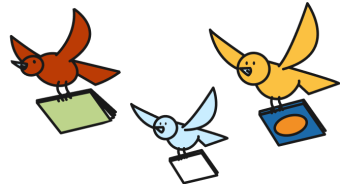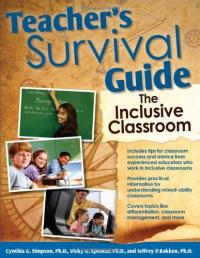
This book addresses the most important issues new teachers face when working with students with disabilities. Topics covered include professional expectations, collaborating with other teachers and therapists, establishing parent relationships that enhance communication, creating an effective learning environment that meets all students’ needs, managing the classroom, using technology wisely, assessing student progress, and planning successful academic instruction. The book includes reproducible pages, tip sheets, and checklists, along with a detailed resource list.
Teacher’s Survival Guide: The Inclusive Classroom
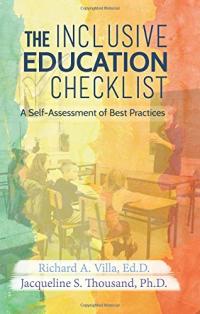
The book offers a checklist of 15 key inclusive education best practices that together comprise quality inclusive education. Each chapter details an individual best practice and provides a list of best practice indicators that deconstruct the best practice. Readers are instructed to rate the degree to which the each indicator occurs in their schools. The Inclusive Education Checklist is an important resource for helping schools, districts, administrators, policy makers, teachers, paraprofessionals and all those committed to inclusive education understand what inclusion is, where their school is on the journey to being truly inclusive, and what needs to be done to ensure continuous improvement.
The Inclusive Education Checklist: A Self-Assessment of Best Practices

Now completely updated and expanded, this guide supports teachers every step of the way in creating a classroom that is responsive to the needs of students with Autism Spectrum Disorder — while keeping your other students and yourself going strong. With 1 in 68 children currently diagnosed with ASD, this is a useful resource for K-8 teachers. Learn how unique individuals on the autistic spectrum differ in their abilities and how these differences may be incorporated in reaching them and teaching them.
Autism Spectrum Disorder in the Inclusive Classroom
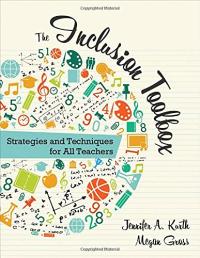
An all-in-one resource that combines research-based strategies and practical tools to help you design and implement a truly inclusive education program. You’ll discover: step-by-step plans for implementing new programs; guidance on how to strengthen existing inclusive programs; strategies to empower and involve families, students with disabilities, and their peers; and tools to assess student interests and develop adaptation plans.
The Inclusion Toolbox: Strategies and Techniques for All Teachers
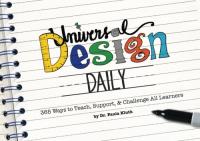
This user-friendly guide was created to help educators learn more about universal design by exploring the practices associated with it. The book features dozens of ideas for providing multiple methods of engagement (e.g., creating personalized learning plans, using collaborative activities, engaging in community building), multiple methods of action and expression (e.g., providing assessment choices, encouraging dialogue, introducing assistive technology), and multiple methods of representation (e.g., teaching with powerful visuals, trying new presentation software, using more than one mode of output during a lecture).
Universal Design Daily: 365 Ways to Teach, Support & Challenge All Learners
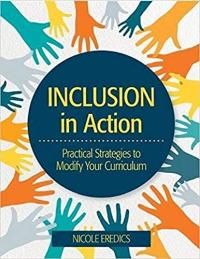
How can K–12 educators break down the barriers to full inclusion and teach all learners effectively? Get guidance on key topics like team collaboration, universal design for learning, co-teaching, social-emotional supports, and accommodations. You’ll get 40 specific, teacher-tested strategies to modify your curriculum for students who work below grade level.
Inclusion in Action: Practical Strategies to Modify Your Curriculum

A funny, comics-format collection of four original fairy tales, that reinvent recognizable stories. A genie just wants a chance to grant a wish to the frog who accidentally let him out of his lamp―meanwhile, the frog just wants to be left alone. A witch is tormented by the cheerful (and awful) singing of a persistent bard, but when she finally snaps and turns him into a rock, he just keeps on singing―somehow the power of terrible music overcomes all magic. A wizard wants a pet. An ogre just wants to make beautiful art.
The Singing Rock and Other Brand-New Fairy Tales

Hamilton Squidlegger is fearless! Well, almost. During the day he can best all the frackensnappers, skelecragons, and bracklesneeds in the swamp, but at night he quakes in terror. Will his father be able to help Hamilton remain fearless in his own mud all night?
The Almost Fearless Hamilton Squidlegger

Captain Alfred is sailing home with new ducks for his farm when his little boat is caught in an unexpected and mighty storm. Everything aboard the ship is flung to the far reaches of the sea, including the very special and beautiful duck egg he had nestled safely inside his fiddle case. But perhaps all is not lost: the little duckling stumbles out of his shell and discovers Captain Alfred’s fiddle, floating not too far away in the waves. And when the duckling embraces the instrument with all his heart, what happens next is pure magic.
The Unexpected Love Story of Alfred Fiddleduckling

Harriet just wants to play her cello alone. But when she accidentally knocks the lonely Moon from his heavenly perch, she learns to share her cello-playing with him. Both find friendship in this delicately illustrated, whimsical tale that presents a Moon and one friend with particular personalities.
Music for Mr. Moon

Just in time for the 50th anniversary of the Apollo Moon landing, the author/illustrator’s spectacular, dramatic but readable look at the mission has been updated and expanded. Additional art has been added to the new portions including a look at the people who worked behind the scenes to make it happen. Additional information about Apollo’s return is also here.
Moonshot

In this striking volume, readers will encounter the Moon in both fact and fiction. Moon myths from various cultures are presented, the impact of the Moon on plant and animal behavior, a brief examination of the first Apollo landing, even a reflection on what the future of Moon exploration may do and more are presented briefly in well organized, clearly noted and stunningly illustrated sections. A glossary of people and terms are included.
The Moon

What could be more fun than going to a birthday party by rocket? Celebrating your birthday on the Moon, of course! That’s just is explored in this playfully illustrated look at the moon, bouncily contrasting it an Earth party. The views of Earth would be stunning making up for the fact that everyone would have to wear space suits. Information is presented in boxes throughout this fanciful journey.
If You Had Your Birthday Party on the Moon

A boy looking out his bedroom window into the night sky begins, “The Moon is out tonight. In the morning, three brave men will climb into a giant rocket … and fly to the Moon.” It’s the Apollo 11 mission which inspires the child for a lifetime. Dramatic, highly realistic illustrations present the narrator’s life on earth interwoven with images and information about the Apollo Moon landing and return. An author’s note reveals that he grew up to build small rockets and an airplane. Fun facts, a glossary, and additional resources are included.
Go for the Moon: A Rocket, a Boy, and the First Moon Landing

Spare, poetic text and luminous, realistic illustrations chronicle the Apollo missions. Comprehensive back matter with photographs adds depth to the presentation. The author, a trained engineer, also presented Countdown: 2979 Days to the Moon (opens in a new window) illustrated by Thomas Gonzalez for readers 9 to 12. The subtitle of this memorable book is the time it took from President John F. Kennedy’s challenge to Neil Armstrong’s first step on the Moon.
Daring Dozen: The Twelve Who Walked on the Moon

Short poems in various forms will inform and engage as they swirl across the pages of this attractive, lively volume. Large pages support the colorful, mixed media illustrations that encourage readers to read about heavenly bodies while gaining tidbits of information, inspiration, and imagination
Comets, Stars, the Moon, and Mars: Space Poems and Paintings
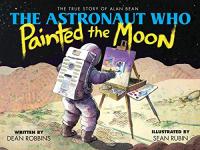
Alan Bean was not the first but the fourth man to walk on the Moon. However, he was the first astronaut to create paintings inspired by what he saw on and from the Moon. The highly readable, handsomely illustrated look at the Apollo 12 astronaut includes information gleaned from interviews with him as well as back matter (biographical information, a timeline and bibliography). This is a unique look at the moon and its impact on one artist/astronaut, sure to inspire others.
The Astronaut Who Painted the Moon: The True Story of Alan Bean

Dani is spending her winter break with her grandparents in Stockholm, away from her best friend Ella. No one can travel with Dani to celebrate Ella’s birthday, so Dani decides to go alone. Not only does she miss Ella’s birthday, she gets sick to boot! Poor Dani but all’s well that ends well as her almost stepmother reminds, her that “where Dani goes, happy follows.” Charmingly told and gently illustrated, this is sure to please young readers.
Where Dani Goes, Happy Follows

What did President Franklin D. Roosevelt have in common with the notorious gangster, Al Capone? It just might have been a car; specifically a bulletproof Cadillac with a V-8 engine. How these men diverged is presented anecdotally with a touch of speculation but in a highly engaging, readable style. Scratchboard illustrations and concluding back matter includes a timeline, additional resources and a few photographs.
Two Men and a Car: Franklin Roosevelt, Al Capone, and a Cadillac V-8

Tornadoes are complex weather phenomena that can be highly destructive. Follow scientist and storm-chaser, Robin Tanamachi, as she researches the genesis of tornadoes and tornadic behavior. Dramatic photographs show not only storm clouds but the aftermath. Charts and other graphics help explain more technical aspects of tornadoes.
The Tornado Scientist: Seeing Inside Severe Storms

Amelia wants to spend just one summer week in Florida. But her always-working father won’t agree. How Amelia finds consolation and friendship in the art studio to which she escapes her too quiet house is wholly plausible and quite touching. Characters develop fully as does the plot in spare, evocative, and effective language.
Sweeping up the Heart

Aisulu’s brother, Serik, wants to become an eagle hunter but ill health prevents it. When Serik is diagnosed with cancer, Aisulu finds the orphaned eaglet and becomes a rare female eagle hunter and competes to win money to pay for Serik’s treatment. Sophisticated readers are likely to enjoy the fast-paced action set in contemporary Western Mongolia.
Stand on the Sky

When things come to an end by various means (natural or induced such as roadkill), they decompose. Young readers may just revel in the gleeful grossness in well researched narrative and lighthearted illustrations. A glossary and bibliography conclude this enlightening but entertaining informational book.
Rotten! Vultures, Beetles, Slime and Nature’s Other

Iris is the only Deaf student in her class. Though sometimes frustrated, she reads lips though prefers to use American Sign Language (ASL). She’s also most comfortable when working with old radios and their components. When she learns about a unique whale, Blue 55, that is not part of a pod she becomes convinced that it, too, is deaf and thus separate from others. And unlikely but riveting adventure with her grandmother leads to healing and a satisfying conclusion.
